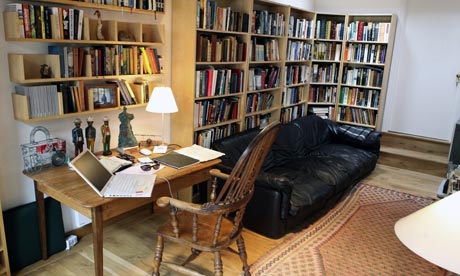0 Comments
Some writers have a dedicated office with everything conveniently placed nearby reference books, computer, research notes, coffee, and whatever else is necessary to practice their art. For others, a not-so-quiet corner of a shared room is all they can hope for. Do writers who have the luxury of a home office get more done than those who work at the kitchen table? The answer is not necessarily. A perfect physical location isn’t the only factor: space also has a time dimension, a mindset, and it might even have an ambience. This article covers these aspects and offers tips on how to create space for your writing.
Establish your physical workspace
You might wish for, or indeed need, complete peace and quiet to mite, but how can you find your ideal spot away from the noise and bustle of your day-to-day home life? One possibility is to convert a spare bedroom or box room into a home office. Another option is to invest in a purpose-built studio for the garden. However, if you’ve no choice but to use shared space, you could use a portable room divider to cordon off a dedicated comer. Alternatively, you might go to a local library or quiet coffee shop, or when the weather permits, take your work outside to a park or a tranquil area of your garden.
Consider your comfort
If you intend to spend an hour or more, you should consider your physical comfort. Sit at a table or desk, preferably in a supportive chair to avoid the discomfort of bad posture; you won’t get much writing done if you’re in pain. Give yourself enough room to stretch your legs and arms so you don’t feel too confined. Always ensure your work space is adequately lit because too little light can cause eyestrain and headaches.
Have everything to hand
You’ll need somewhere to conveniently stow all your paraphernalia between writing sessions. If you travel light on the road, you might require nothing more than a box file. If you need to do lots of research, invest in a bookcase, put up a shelf or two, buy a filing cabinet, or get a storage box to keep your books and papers in order.
Give yourself enough time
Your workspace can be spacious, comfortable, and well equipped, but if you give yourself little time to focus, you’re doomed. How much time is enough? That’s a good question, and the answer depends on your circumstances and your goals. Give yourself too little time and you’ll make very little progress, and you might find you’ve given up before you’ve started. Realistically, you need to dedicate at least half an hour a day, preferably an hour. Anything less than 3o minutes a day and you’re unlikely to get into the correct frame of mind.
Cultivate a working mindset
You might love writing so much that it feels more like play than work, but toil, determination, and perseverance are what will get you from the ideas stage to a finished work. Having a quiet location and enough time to complete your thoughts are necessary, but the correct mindset is important too. You need to put your thinking cap or head on, so to speak. Importantly, you will need to differentiate time from your family or rest and relaxation time without feeling guilty or rushed. If necessary, negotiate some time slots when those you live with agree not to disturb you.
If you’re having trouble getting started or staying focused, treat your writing as you would a job. Don’t settle down to work in your nightclothes or a pair of scruffy jeans and a T-shirt. Opt for smart casual dress instead. Sit upright in your chair. Schedule your day. Don’t sneak off for a coffee break every hour. Plan each session or you run the risk of spending your valuable time fretting over what to do rather than getting the words down. Set goals and deadlines. Keep your desk tidy so you know where everything is. Set up a filing system. Being organized will lend your overall time a professional quality that is conducive to getting things done.
Promote a creative atmosphere
A quiet, relaxing, and pleasant atmosphere is good. A little background music could help here, if you don’t need silence to work. You could try creating a mood evocative of the theme of your writing so for example, you could write a spooky story by candlelight or a steamy scene while listening to sensuous music.
Whether you work in your kitchen or in a home office, you can make your writing space special and fit for purpose. There are enough obstacles, real and imagined, that stand in the way of a fruitful writing session, without letting an uncomfortable or impractical workspace, an unpleasant ambience, poor organization, or bad timing be yet another reason not to immerse yourself in your creative pursuit.
